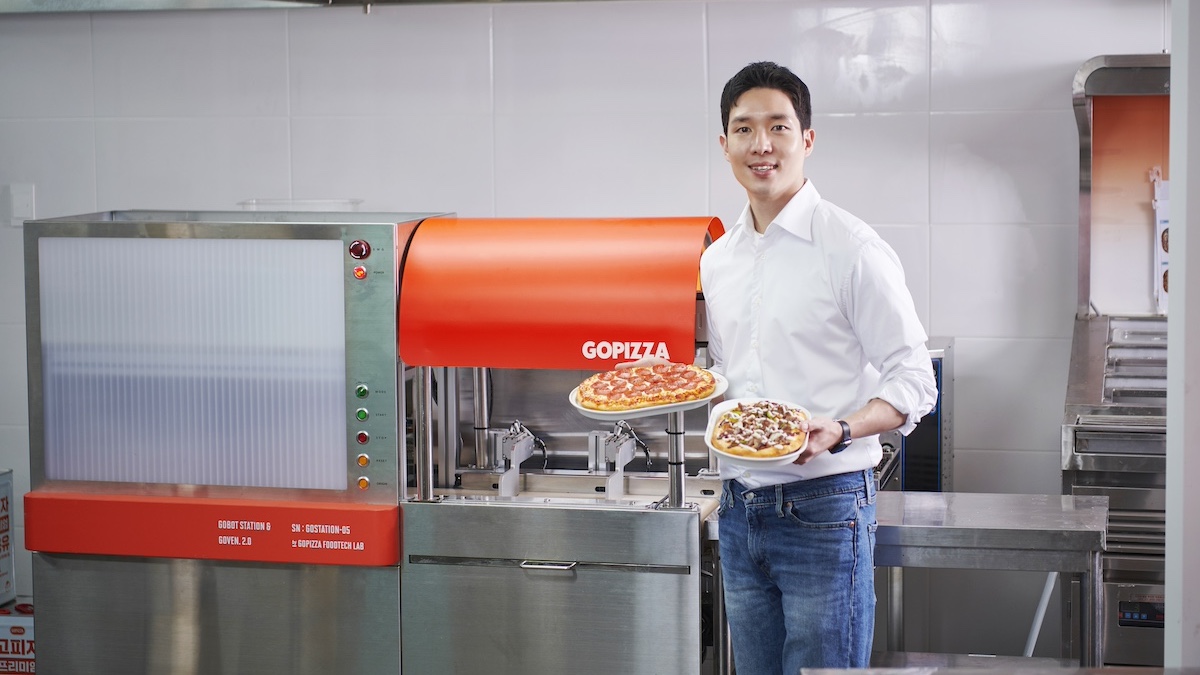GOPIZZA is a startup pizza brand that aims to revolutionise the global food industry by serving hot pizza within five minutes of ordering. Now in the second phase of its growth, GOPIZZA recently partnered with South Korea’s GS25 convenience store chain to massively expand its presence across South Korea.
Vulcan Post recently spoke with GOPIZZA CEO Jay Lim over a hot slice of pizza to discuss GOPIZZA’s rapid expansion from a single food truck to five countries and his business strategy of using AI to ensure that there are “Pizzas Everywhere.”
I understand you just raised an additional $10 million from Thailand’s CP ALL, the distribution affiliate of CP Group, which owns the 7-Eleven convenience store chain in Thailand. GOPIZZA already plans to open 20 stores in Thailand this year, but recent news also states you intend to grow to 2,000 stores in South Korea and 10,000 globally.
My initial dream when I started up this business in 2016 was to eventually have 10,000 stores globally, but my dream has now turned into a very viable business target! In South Korea, we just started a partnership with the GS25 convenience store chain – and we initially announced a goal of opening 1,000 stores by the end of 2024, but the performance of the first 250 stores that we opened in May has done so well, that GS25 have increased their target to have 2,000 by the end of this year! This means that we should have between 2,200 to 3,000 stores globally by year’s end!
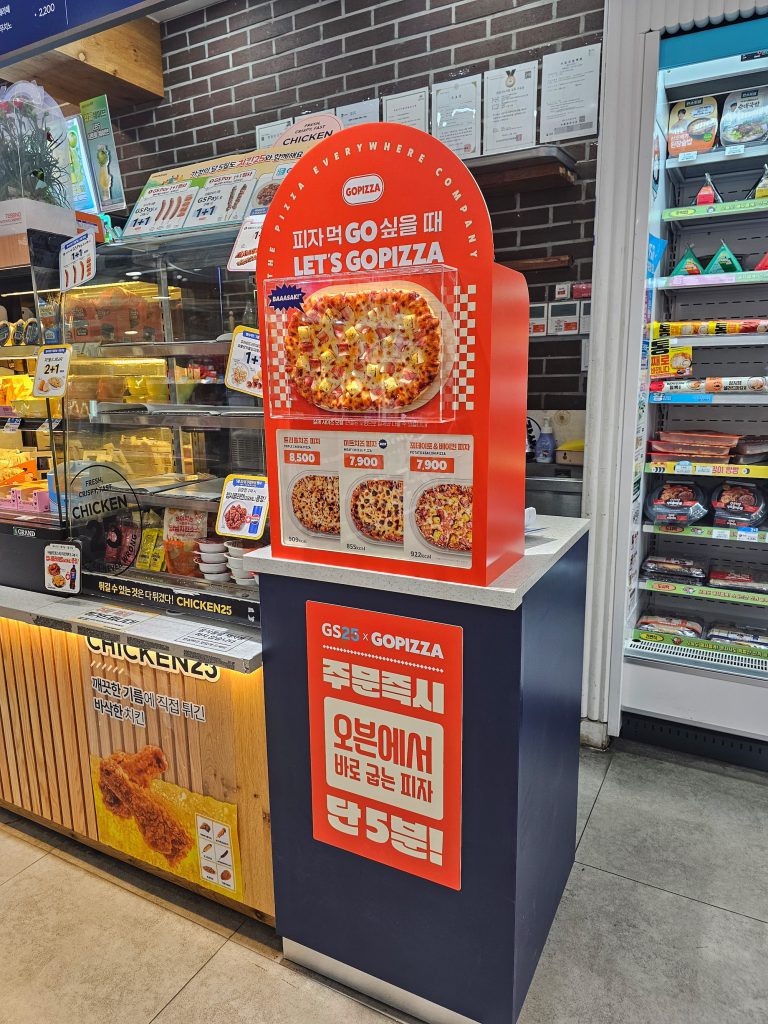
With the CP Group infusion, your total raised funding now stands at US$43 million.
US$43 million, yes, though KRW 60 billion is a more accurate estimate.
You’ve just been travelling around the region for business?
We have five different entities in five different countries, so I will usually visit every market at least once a quarter. Singapore is the most frequent market that I visit, just because it’s a strategic location, I usually go to Thailand or India from Singapore. So I come to Singapore, probably every two months, but usually just for 24 hours to 48 hours, Max.
I also studied at SMU, so Singapore is very familiar to me. In fact, I was just at DBS bank for some admin, and they told me I already had a personal account with them, which I’d forgotten about as it was started 14 years ago!
You have stores in NTUC Fairprice and Cathay Cineplexes in Singapore. But with your partnership with CP Group, there’s some speculation about you going into convenience stores in Singapore as well.
Nothing is confirmed. But you know, CP Group obviously has 7-Eleven Thailand in mind when they invested in us, and we’ve proved our business model with GS25. So I would hope that other 7-Eleven licensors will feel more comfortable to at least try a pilot GOVEN Mini. We know what happens after the pilot results are good, which we experienced in South Korea with GS25.
For Singapore, it’s never going to be as many units as Thailand or South Korea, because they have more than 10,000 stores in each country. But obviously, Singapore is an expensive market to be in and with the labour crisis, labour costs, rental, ingredient costs and inflation, we think partnerships going into convenience stores is a much better strategy to do in Singapore, more so than Thailand, because it’s basically leveraging the retailer’s property and labour cost to deliver customers with a more value for money product.
Vulcan Post’s previous article covered how GOPIZZA is quite flexible with your modular kitchen, and how you can have stores in malls, schools and convenience stores. Do you own or license your business in Singapore??
Of the 29 GOPIZZA stores in Singapore, half are corporate-owned, while most are franchises. We also have a few partners, like NTUC Fairprice, which buys our store solution and operates it inside its retail outlets.
How do you tailor your business to each country, especially as your “prebaked” dough is the most important ingredient of your pizza?
Our main dough factory is in South Korea, and we will export from there for each country’s initial stage. But when we have a large local quantity or a local requirement, like meeting halal certification in Indonesia, we build a local factory. So we currently have dough factories in Indonesia and India alongside the Korea main factory. Thailand and Singapore, use dough imported from Korea, but in Indonesia and India, the dough is locally produced.
Are more local flavours coming?
For local flavours, we have the chilli crab pizza, which is exclusive to our Changi Airport store. And, of course, we have the ayam taliwang pizza, which is exclusive to the recently opened NTUC FairPrice Finest Ang Mo Kio Block 712.
We recently had a promotion for the Singapore vs. South Korean World Cup Qualifiers, including a Singapore Set with the ayam taliwang pizza, chili crab pizza, kecap manis drumlets and sambal fishballs, versus a Korean Set with bacon potato pizza, K-bulgogi pizza, cheese topokki and yangnyum drumlets.
What are GOPIZZA’s current plans for Malaysia?
We have a very small footprint in Malaysia with a single store operated by a partner. As you may know, Malaysia’s economy is booming, and now that we are halal-certified in Indonesia, this enables us to export our dough to Malaysia. We are now looking for a master franchise or partners in Malaysia as well. But we have many markets that we have to cover ourselves, so an expansion in Malaysia is in the pipeline, probably in 12 to 18 months.
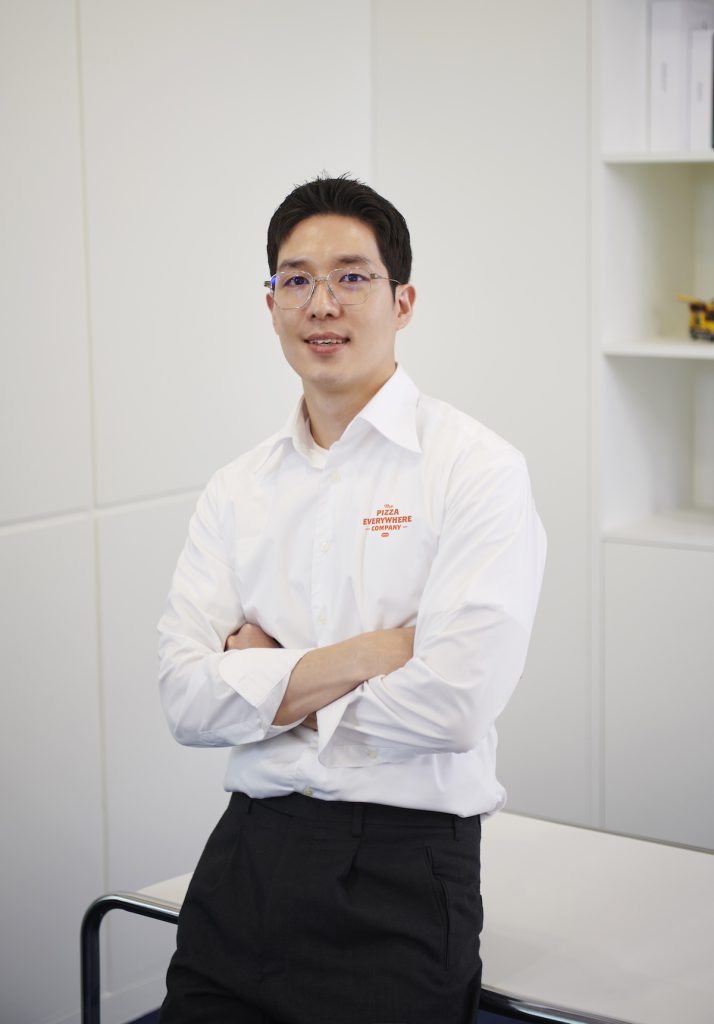
Business Scalability and Technology
Regarding GOPIZZA’s scalability, I find it very interesting how you are able to offer different solutions for different markets.
The key difference between IT services and our restaurant business is that the restaurant business is much, much less scalable because it’s a ‘heavier’ business – It’s offline and has hardware, humans and property, thus much heavier than an IT service. And at the same time, it’s also difficult to maintain consistency across stores, so if you scale up too fast, your consistency breaks, while for an IT business, scalability, and consistency are engraved in the DNA of the business itself. For FNB, or offline businesses like us. It’s not in the DNA, it’s actually contradictory so the more scalability you have, the bigger the chance that your consistency will break.
FNB businesses are usually the least sought-after industry for Venture Capital (VC) investments because it’s usually not scalable, and consistency is very difficult to maintain, compared to IT services or manufactured products.
This is why we developed proprietary food tech and tried to make our pizza operation easier and as ‘light’ and simple as possible so that our business resembles an IT service, making it scalable and consistent at the same time.
We pioneered the ‘store-within-a-store’ concept and now have a 40cm2 store footprint in the GS25 convenience store chain, which has proved how light a store can be. We are now opening 60 GOPIZZA stores a week with GS25, which proves our concept of making our business lighter and more consistent.
So GOPIZZA is not only a restaurant business; you are also a food-tech company that manufactures its own dough and ovens?
We have four different technologies: One is the “parbaked” dough. One is the AI Smart Topping Table, which tracks the progress of the topping, and enables monitoring the accuracy of the pizza topping, layer by layer. We manufacture our own ovens, and during the COVID-19 pandemic, we also delved into robotics. So we have an automated pizza line in selected shops, that processes the pizza after it’s baked. So it cuts the pizza, and it keeps them in a queue. So the crew just have to take it and give it to the customer.
GOPIZZA has four core technologies. So one is food ingredients. One is mechanics, one is AI, and one is robotics.
It’s also interesting that you can track ingredients with your AI tech, so you basically get live data about ingredient use from any store, anywhere.
We are in the stage of rolling out our AI Smart Topping Table. The primary goal of the AI Smart Topping Table is to first train new crew as the restaurant business has a high turnover, and training the new crews with the topping takes the most time and labour. So when you actually have a person quitting, you usually have to have another crewmember training a new replacement – this is why there is a lot of ‘leakage’ in terms of labour inefficiency in the fast food business. So we want to train them with AI. The second part is the topping, which we can measure to ensure every pizza gets the right amount of topping.
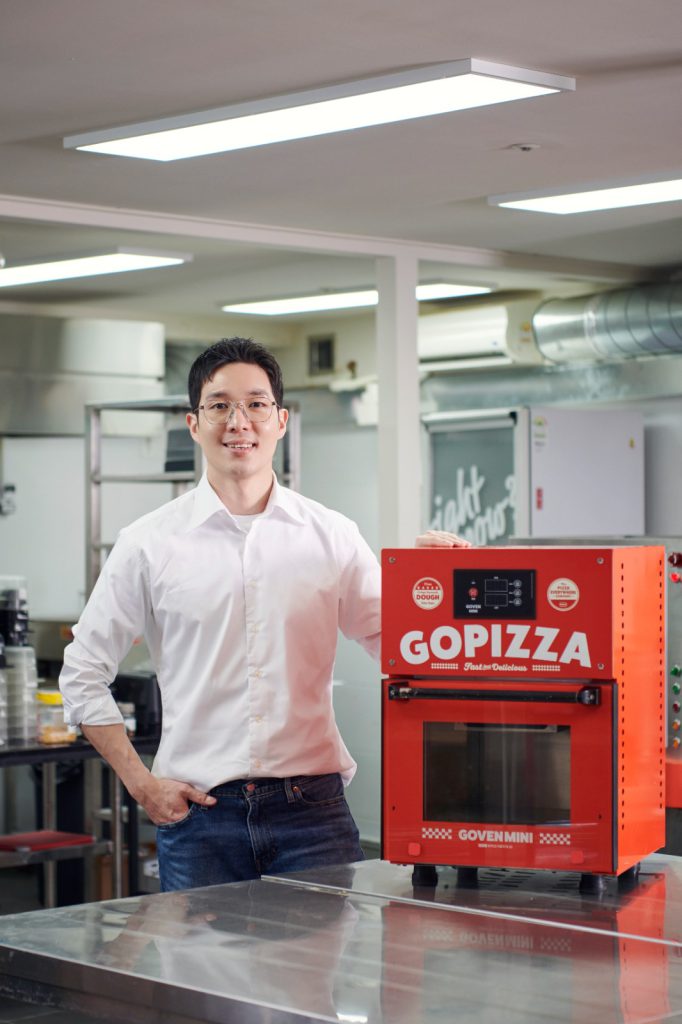
GOVEN Mini for convenience stores
Would it be possible to share more information on the GOVEN Mini? Could you provide details on its specifications, size, temperature, functions, and features?
The GOVEN Mini is a compact oven designed by the GOPIZZA Food Tech Lab to maintain the taste and quality of GOPIZZA, even in the limited spaces of GS25 convenience stores. This ultra-small oven, roughly the size of a coffee machine, has obtained KC certification in Korea. It can bake a frozen GOPIZZA to crispy perfection in about 5 minutes at approximately 220°C. Equipped with three preset options specifically for GOPIZZA frozen pizzas, it ensures consistent quality and efficient cooking. In comparative tests conducted by GS25, the GOVEN Mini demonstrated superior performance in both cooking time and product quality, leading to a supply contract with GS25. This mini oven is the culmination of our expertise in oven design and production from previous models, combined with our “parbaked” dough technology. It is the most efficient and unique “total pizza solution” in the market, setting us apart from other pizza brands.
How did GOPIZZA come up with the design of the GOVEN Mini?
The design of the GOVEN Mini was driven by the specific requirements from GS25, although the need for a smaller oven was something we had considered for a long time. We had missed numerous opportunities in the past due to the size constraints of conventional pizza ovens. To fulfil our vision of “The Pizza Everywhere Company” and allow customers to enjoy pizza anywhere, we needed an oven that could function in spaces as small as 3 square metres(m²), like those in GS25 stores. We tested all existing small ovens but encountered issues such as long cooking times, uneven cooking, and lack of crispiness. To overcome these challenges, we realised the necessity of creating a specialised small pizza oven ourselves. Initially, we aimed for a more visually appealing design with an arch-shaped top, but practicality and size efficiency led us to the current rectangular design, which we believe is the most practical and efficient solution.
What was the R&D process for GOPIZZA’s GOVEN Mini like?
The R&D process for the GOVEN Mini was incredibly demanding and challenging. While we have had experience in designing and manufacturing ovens since the GOVEN 1.0, our previous production capacity was limited to about 10 units per month. Securing a contract with GS25 to open 1,000 stores in almost a 6-month timeframe required us to scale up production significantly. Besides the production capacity, another major challenge was obtaining KC certification, which typically takes 6 to 12 months, in just 3 months. This rapid development timeline was daunting, but with the accumulated knowledge from our past experiences and the tremendous effort from our dedicated team working tirelessly, even on weekends, we managed to achieve it.
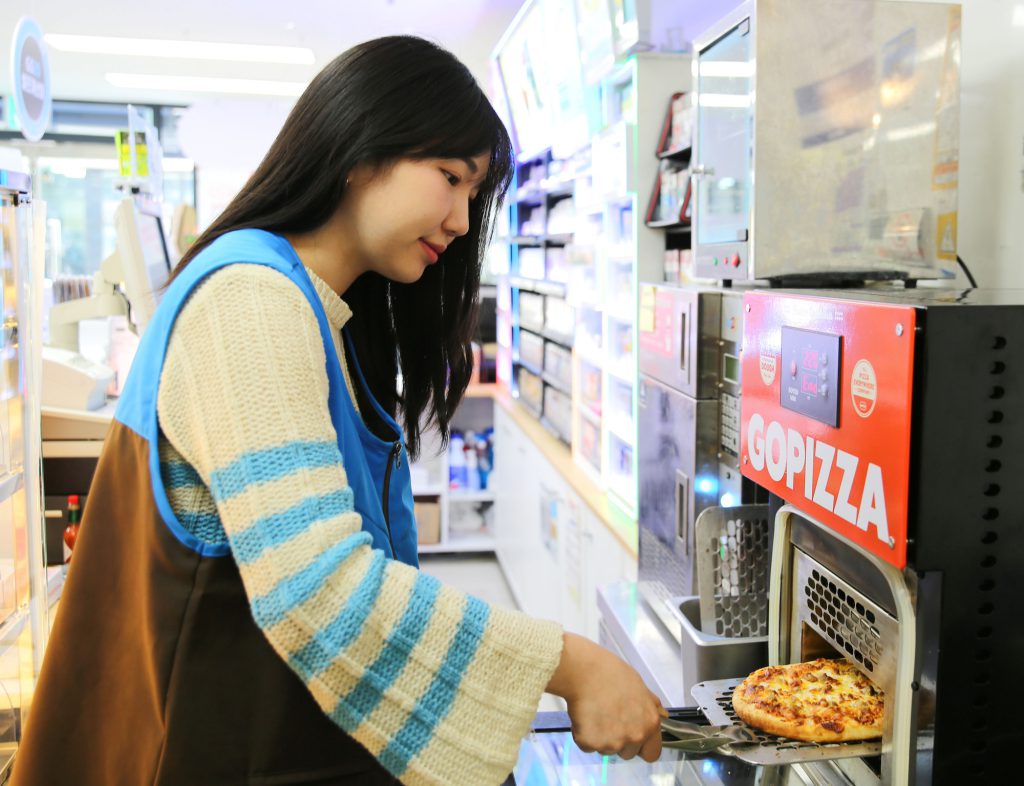
Integrating AI into every pizza
Could Jay share any key lessons or takeaways from the challenges that arose surrounding GOPIZZA’s AI integration?
Many food tech companies have attempted to implement AI solutions, but few have successfully integrated them into everyday operations due to high initial costs and the complex environment of busy kitchens where countless variables can affect the performance of AI systems. Issues such as the adaptability of the technology and speed limitations compared to human workers often prevent these solutions from being fully deployed.
Despite these challenges, GOPIZZA has been working on integrating our AI Smart Topping Table technology, for which we obtained a US patent in 2023. We have continuously improved our AI’s learning data and recognition capabilities and are now close to full-scale implementation. Operating over 450 Quick Service Restaurant (QSR) stores globally, we have amassed a vast library of pizza images for AI learning, which is unparalleled by any other QSR brand. Unlike lab-generated data from tech companies, our data encompasses the real-world variables of actual restaurant operations, making it highly valuable.
Our AI development is driven by three key pillars:
1) our deep understanding of hardware from oven development,
2) operational know-how from running a pizza franchise, and
3) advanced AI software technology from our in-house food-tech lab.
These three pillars have allowed us to create a practical and innovative solution that no other brand can match. Our AI technology will enable new employees to make perfect pizzas every time under AI guidance, allow headquarters to track and manage the quality of pizzas made in stores worldwide, and facilitate training for new recipes without extensive in-person instruction.
This comprehensive approach ensures that our AI integration is both practical and revolutionary, positioning GOPIZZA at the forefront of food tech innovation.

